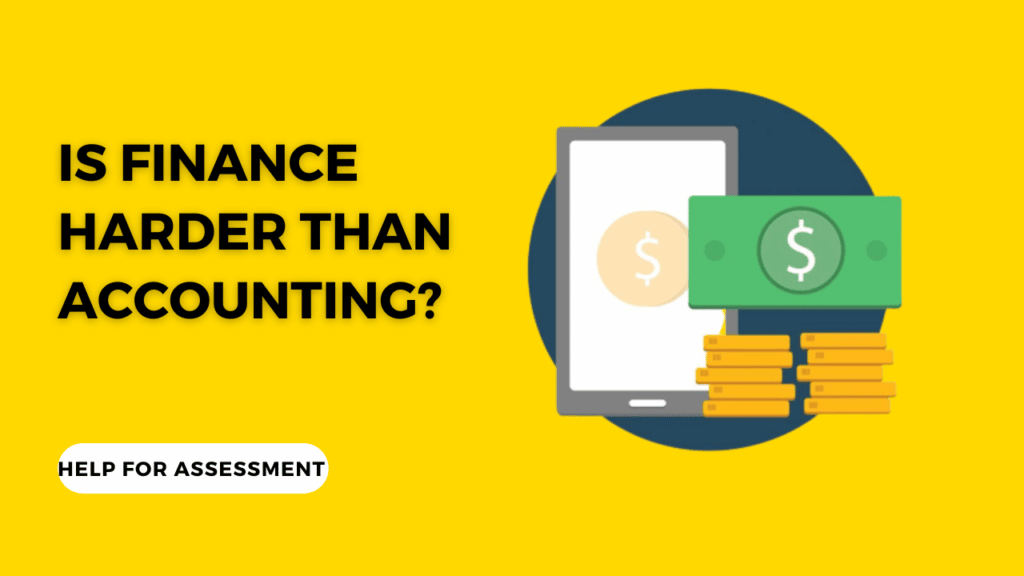Are you considering studying Finance or Accounting and wish to discover which is simpler or more challenging?
This guide is for you.
Key Takeaway
- Accounting is a subject that is more difficult to learn than finance. Accounting is more complex, mostly because it relies on precise sets of arithmetic principles.
- Finance necessitates a grasp of economics and accounting, but it does rely on your passion and talents.
What is Finance?
We can define finance as the ability to engage with organizations to simplify and enhance operational performance via financial planning, investment, problem solving, and budgeting.
On the other hand, the accounting courses focuses on teaching students how to record company transactions, maintain account ledgers, and prepare tax reports.
What You Need to Know About the Finance Course
Finance courses do not include difficult mathematics. In fact, the majority of finance courses often include economics and accounting.
However, courses with a greater emphasis on economics might make obtaining a finance degree challenging.
If you are interested in finance and competent with mathematics, you will likely not find it very challenging. Moreover, students that excel in finance are often well organized, attentive to detail, strong communicators, and possess some mathematical and statistical abilities.
As you will spend much time doing calculations for future modeling, mastering Excel will facilitate your financial studies.
Since Accounting and Finance have a connection, it is important to learn the fundamentals of accounting, such as how to read and interpret income statements and balance sheets. This knowledge will put you in a strong position to succeed in Finance.
For instance, Illinois University’s Financial Management Specialization course provides strategic financial management, encompassing financial accounting, investments, and corporate finance.
What You Need to Know About the Accounting Course
Understanding accounting principles and transactions function is the most challenging aspect of learning accounting.
In classes such as corporate accounting, for instance, accounting ideas determine what you may and may not do, as well as how you must go about achieving either outcome.
However, if you understand the basics of accounting, such as having a clear grip on how debits and credits function, accounting should not be that difficult to learn.
Debits indicate where money has been expended (expenses and assets), whereas credits indicate where money has originated (income) (revenues, liabilities, and equities).
A degree in accounting still requires a significant amount of study, as well as a great deal of quantitative work.
In addition to learning several technical words, you must also have an understanding of computer software.
If you are concerned with mathematics, you do not need to be a math genius. In reality, mathematics is straightforward. You will be all right if you can add, subtract, multiply, and divide.
As said previously, grasping the fundamentals might be difficult, but once you master, the degree becomes much more manageable.
An important thing to remember is that combining logic and common sense facilitates accounting comprehension. When dealing with financial accounting, consider the situation logically and how everything is supposed to fit together.
What Can You Do With a Major in Finance and Accounting?
Having a degree in Finance, Accounting, or both will provide several employment prospects. Here are a few employment choices available:
| Finance Major | Accounting Major |
| Financial Planner $87,850 | Accountant $71,550 |
| Financial Analyst $81,590 | Auditor $73,560 |
| Budget Analyst $76,640 | Managerial Accountant $76,230 |
| Actuary $108,350 | Financial Analyst $83,660 |
| Accountant $71,550 | Tax Accountant $$55,640 |
| Credit Analyst $73,650 | Bookkeeping $42,410 |
| Attorney $122,960 | |
| Commercial Real Estate Agent $42,500 |
Source: U.S. Bureau of Labor Statistics (bls.gov)
Once qualified, you will have several career options to choose. The good news is that employment in Finance and Accounting are constantly in demand.
These are only a few career routes. Keep in that these salaries serve as an indicator of earning potential, since they will vary based on the kind, size, and location of the business.
Final Thoughts
Majoring in finance or accounting will lead to high-demand, well-paying careers.
Accounting is a more difficult discipline to understand than finance. Accounting is regulated by stringent sets of mathematical principles, making it more complex. Finance requires an understanding of economics and accounting.
Despite this, no major is simple, and each demands a substantial amount of effort. The amount of difficulty relies heavily on your talents, interests, and abilities.

